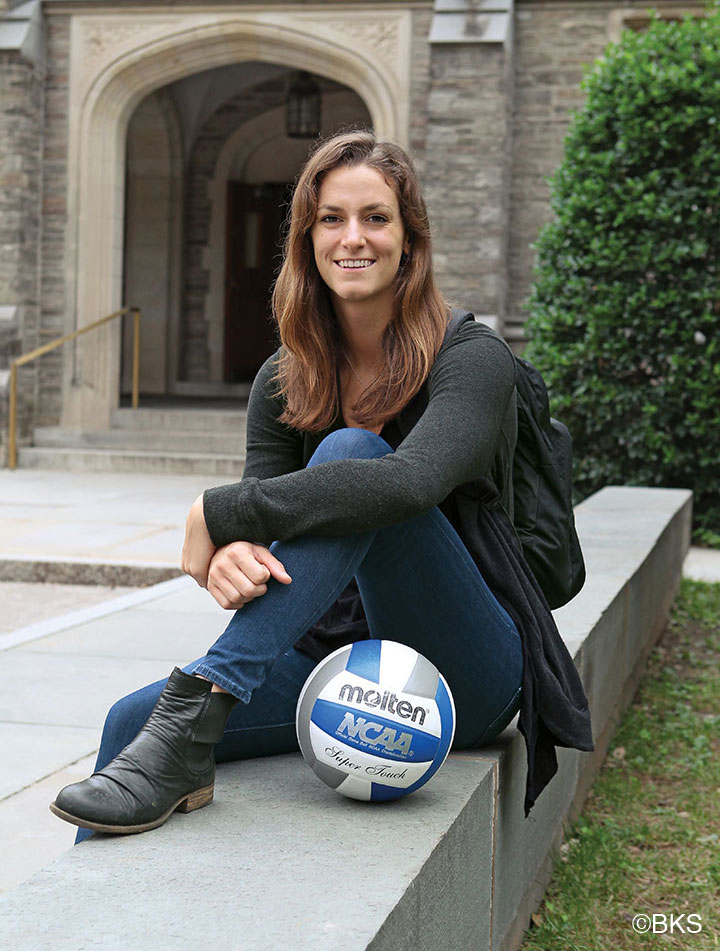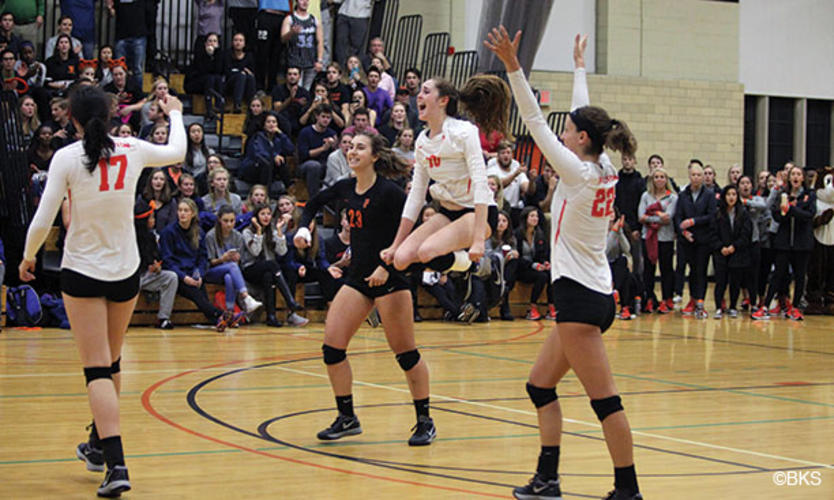Women’s Volleyball: In the Swing of Things
Mattaliano ’17 enjoys the familiar, busy routine of an Ivy League season
A few minutes into Princeton’s Sept. 30 volleyball game against Harvard, Cara Mattaliano ’17 made her first kill, spiking the ball cross-court through a seam in the block. She clenched her hands into fists and punched the air twice in celebration, then joined her teammates in the huddle they make after every play, slapping the two women next to her on the back.
The stands of Dillon Gym were packed to capacity with about 1,000 spectators, the most in Mattaliano’s memory. Last year, Princeton and Harvard tied for the Ivy League title; the Crimson won the playoff match, earning the league’s bid to the NCAA Championships. Nearly 10 months later, the Tigers were eager for a rematch.
In the last two seasons Princeton has gone from an Ivy underdog to a dominating force with an eye on the NCAA postseason. When asked what has made the difference, Mattaliano says it’s the little things, what you do day in, day out. What follows is a glimpse at that routine — a week in the life of a Princeton varsity athlete.
The alarm goes off at 6:45 on Monday morning. Weightlifting starts at 7:15 and goes until 8. Out of season, the team does squats and “serious” lifting. In season, the lift is more relaxed. Afterward, Mattaliano heads to breakfast at Cottage Club with a few of her teammates, who usually make up half of the breakfast contingent. At 9 a.m., it’s modernist art history, followed by linguistics at 10 a.m. and U.S. history, 1920–1974, at 11 a.m.
Mattaliano is a history major with a focus on contemporary affairs. “I like being a history major because I like looking at the present in a historical context,” she says. As for the thesis, like most of her classmates, she says the year is young and her topic is in the works. For now, Mattaliano thinks she will write about the perception and effect of U.S. foreign policy in Central America.
Monday afternoon means an audio-journalism seminar with a professor who writes and reports for the NPR program Planet Money. It’s Mattaliano’s fourth journalism class at Princeton. Though she does not have time to write for campus publications, she fulfills her taste for journalism in the classroom. Over the summer, Mattaliano worked at the Global Press Institute, which trains female researchers and journalists around the world, doing research and fact-checking.
Every afternoon at 4:30, Mattaliano changes in her room and goes to Dillon for practice. Women’s volleyball is one of the few teams on campus without its own locker room (players share the changing room used by fitness-center visitors), but Mattaliano says she would not trade Dillon for anything.
“The atmosphere is so electric when you have fans there. I wouldn’t want to play anywhere else,” she says. “There is so much history there. Every female Princeton volleyball player has played there. Even my coach [Sabrina King ’01] played there.”
Mattaliano says King rarely shares anecdotes from her time playing at Princeton, but occasional memories slip through. Once, she says, King joked that the women are lucky to have shades in the gym — years ago, you positioned the ball in the sun to get points.
Dillon feels very different on Monday afternoon, without 1,000 fans filling the stands. The team spends most of the week doing drills — passing and setting from a serve, for example, which is crucial to the start of any play. Only on Friday, before matches, are the women allowed to scrimmage. But even in drills, the spirit and bond among the Princeton women is intense.“We do pride ourselves on having a lot of energy,” Mattaliano says. The team has a long list of acronyms that punctuate the end of cheers, from T.C.B. (“take care of business”) to F.B.K. (“first ball kill,” the quickest way to score a point when receiving serve). Mattaliano says some cheers stay serious, while others quickly devolve into nonsense shared among friends.
After practice, dinner at Cottage is followed by an evening session at Firestone Library with her friends and her books. On Tuesday morning, Mattaliano gets to sleep in past 7 a.m. and attends her only scheduled class of the day. She explains that naps are an essential Tuesday tradition, a necessity that many non-athletes at Princeton claim not to have time for. For Mattaliano, as for other Division I athletes, prioritizing rest and recovery makes for a highly efficient work ethic.
“My time is a lot more structured,” Mattaliano says of her days. She knows what is important to her and what is not, and as a result, she rarely feels like she has too much on her plate. When she has free time, she works ahead to get her readings and other schoolwork finished.
When she’s not powering through history texts, Mattaliano spends time “figuring out what I’m going to do with my life.” For now, she is keeping her options open, applying for fellowships and for Teach for America, as well as for consulting jobs.
Wednesday begins at 6:45 a.m. and follows the same class schedule as Monday, minus the seminar. During practice, the team does scouting, watching tape from other teams it is going to play “so we don’t go in blind,” Mattaliano says. On Thursday they’ll move on to defense drills — less jumping to save the players’ legs.
Friday is game day, and the day the parents arrive. Mattaliano gets up early to mix a podcast for audio journalism, then heads to brunch with her parents, Alfred and Molly Mattaliano, who have made the trip from Glen Ellyn, Ill. The two are well-versed in volleyball — Cara has played for more than 10 years, and her older sister competed at Boston College. Though her parents are at the head of her support network, Mattaliano is quick to point out the many people who have been in her court at Princeton — including Louie, the team’s bus driver and No. 1 fan, who brings the women strawberries for their road trips.
The players gather for a team meal at 4 p.m. An hour and a half later, they are on the court, practicing serves and passes while their warmup playlist plays. Always on the soundtrack is Klingande’s “Jubel,” which Mattaliano said has been the team’s favorite song for years. When the other team warms up, the speakers always play an electronic version of “Sweet Caroline” and the Princeton women dance to it. Seven is game time.
The action moves quickly: Less than two hours after the first serve, Princeton has swept Harvard, 3–0, thanks in large part to Mattaliano, who finishes the match with 12 kills, two aces, and two blocks. When the last point is made, the Princeton team rushes the court and immediately joins in its familiar huddle. Mattaliano hugs her parents. Some players speak to a group of Princeton High School volleyball players. King gathers the Tigers again, congratulates them on the win, and reminds them that they’re not to celebrate yet — tomorrow they play Dartmouth. (Princeton would sweep again, extending its winning streak; as of Nov. 3, the Tigers were a perfect 10–0 in Ivy play.) Half an hour later, once the crowd has dispersed, Mattaliano heads to Witherspoon Grill with her parents, wearing sweatpants over her uniform shorts.
On Monday, she will wake up and start over again. Mattaliano has grown attached to certain parts of her routine — Dillon Gym, the team cheers. Her life has circled around volleyball for a decade, and that will be over at the end of the season. “Being part of a team on campus is something I’m really going to miss,” she says.













No responses yet